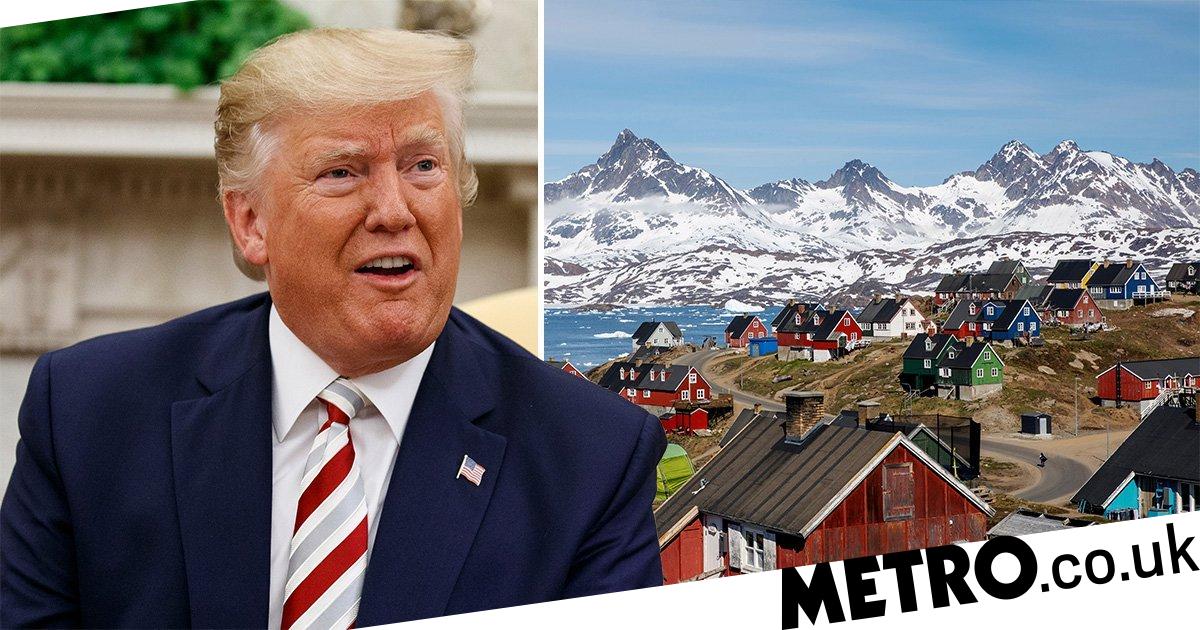


As Donald Trump's threat to buy Greenland stirs global controversy, Denmark's foreign minister reaffirms their recognition of Greenland's autonomy and dismisses any possibility of the island becoming a US state. However, amid increased US interest in the Arctic region, Trump's willingness to use force or economic measures to acquire Greenland has prompted concerns from European allies. As talks between Greenland's leader and the Danish king take place, there is a growing focus on the island's push for independence and allegations of colonial-era mistreatment.
Trump's Greenland Ambitions: A Saga of Sovereignty, Autonomy, and Geopolitics
Donald Trump's 2019 proposal to purchase Greenland from Denmark sparked a global outcry. The move highlighted a clash of interests in the Arctic region and raised questions about Greenland's autonomy and the future of international relations in the far north.
Background: Greenland's Colonial Past and Autonomy
Greenland, the world's largest island, has been a Danish territory since 1814. However, a process of home rule began in 1979, giving Greenland significant autonomy in domestic affairs. Greenland's population of 56,000 is predominantly Inuit, and the island has a strong drive for independence.
Trump's Proposal and Denmark's Response
In August 2019, Trump reportedly expressed interest in buying Greenland for strategic military purposes. Denmark's Foreign Minister Anders Samuelsen promptly dismissed the proposal as "absurd" and reaffirmed Greenland's autonomy within the Danish realm.
Geopolitical Concerns
Trump's proposal coincided with increased US interest in the Arctic, which is becoming more accessible due to climate change. The region holds vast mineral resources and potential shipping routes, making it a strategic hotspot. Trump's willingness to use force or economic pressure to acquire Greenland raised concerns among European allies, who feared a potential disruption to the stability of the Arctic.
Greenland's Independence Movement
Amid the controversy, Greenland's independence movement gained momentum. Greenland's Prime Minister Kim Kielsen and King Frederik of Denmark held talks to discuss the island's future. Kielsen emphasized Greenland's right to self-determination and expressed concern about Denmark's handling of the Trump proposal.
Top 5 FAQs and Answers
Why did Trump want to buy Greenland? Trump reportedly wanted to acquire Greenland for military purposes, as it would give the US greater access to the Arctic region.
Can Denmark sell Greenland? Denmark cannot legally sell Greenland without the consent of the Greenlandic people. Greenland enjoys autonomy in domestic affairs and has a strong drive for independence.
Will Greenland become independent? Greenland's future status is uncertain. The island is seeking greater autonomy, but complete independence would require a referendum approved by both Greenland and Denmark.
What is the significance of the Arctic region? The Arctic is becoming increasingly accessible due to climate change. It holds vast mineral resources and potential shipping routes, making it a strategic geopolitical hotspot.
What is the history of Denmark's colonial rule in Greenland? Denmark has been in control of Greenland since 1814, but has gradually granted the island greater autonomy. There are allegations of colonial-era mistreatment, which have become a topic of debate in recent years.

In a significant move, the descendants of Netaji Subhas Chandra Bose have urged Prime Minister Narendra Modi to institute a tradition of hoisting the National Flag at the Red Fort every year, to commemorate the establishment of the Azad Hind Government on October 21. The Azad Hind Government, formed under Netaji's leadership, played a key role in the fight for India's independence during World War II. With the 82nd anniversary of its establishment approaching, this request holds even more significance in honoring the sacrifices made by the Azad Hind Fauj.

Prime Minister Narendra Modi spent Diwali in an unconventional manner, celebrating the festival of lights with Indian Navy personnel onboard the aircraft carrier INS Vikrant. During his visit, Modi praised the INS Vikrant as a symbol of Aatmanirbhar Bharat and also witnessed a stunning air power demo by MiG 29K fighter jets taking off and landing on the short runway of the aircraft carrier. Modi was also deeply moved by a special cultural performance by the sailors, dedicated to the success of the Indian Armed Forces. He ended the evening by joining in the tradition of Bara Khana with the naval personnel. On the next day, Modi joined a yoga session on deck and watched a spectacular steampast of warships and flypast by aircraft.

Indian Prime Minister Narendra Modi celebrated Diwali with Navy personnel on the country's new aircraft carrier, INS Vikrant. He extended Diwali greetings to the nation and shared highlights from his visit, including an air power demonstration and cultural program. PM Modi also addressed the significance of Diwali and expressed his best wishes to the families of the Navy personnel.

In a tense meeting at the White House, President Donald Trump urged Ukrainian President Volodymyr Zelensky to accept Russian President Vladimir Putin's terms for ending the two-year war in Ukraine. Despite seeking more military support from the US, Zelensky was met with resistance from Trump, who reportedly engaged in a "screaming match" with the Ukrainian leader. The US leader even claimed that Putin saw the conflict as a "special operation" rather than a full-fledged war, further complicating negotiations between the two nations.

As Liverpool struggled to find their form in a tough game against Manchester United, Dutch midfielder Cody Gakpo stood out with his sharp attack and strong composure. Despite hitting the woodwork three times, Gakpo managed to score a brilliant equalizer for his team, showcasing his potential and talent on the field. While Liverpool may have lost the match, Gakpo's impressive performance provided a glimmer of hope for a struggling team.

Ayodhya's Deepotsav 2025 was a shining example of faith, community, and innovation as the city set two new world records with over 26 lakh diyas and a grand aarti performed by 2,100 priests. The event, witnessed by Chief Minister Yogi Adityanath, also showcased a spectacular 3D projection mapping and drone light show that brought Lord Ram's story to life in the night sky. The event was a testament to the deep connection Ayodhya's youth have with Lord Ram's ideals and was made possible by the hard work of over 40 potter families and thousands of volunteers.

In a brazen and perfectly orchestrated robbery, a group of thieves infiltrated the world-famous Louvre Museum in Paris on Sunday morning and made off with a collection of priceless jewels with an estimated value in the millions. French officials confirmed the robbery and began a detailed investigation to determine how the culprits managed to evade the museum's advanced security systems and execute the crime in under seven minutes. This latest incident has raised serious concerns about the protection of national treasures at one of the world's most popular tourist destinations.

In an audacious heist, a group of armed thieves breached security at the iconic Louvre Museum in Paris and stole nine valuable jewels from the collection of Napoleon Bonaparte and Empress Joséphine. The robbery, which took place in just seven minutes, has prompted a full-scale police investigation and raised concerns about the museum's security. French officials are working to recover the stolen items, but the Louvre remains closed to visitors.

Despite a ceasefire in early October, the conflict between Israel and Palestine shows no signs of abating, with reports of ongoing deadly clashes and Israeli tank fire targeting a car in Gaza City. The closure of the Rafah border crossing to Egypt, citing Hamas's failure to retrieve bodies, has further exacerbated tensions. However, experts warn of the uncertain future for a transitional government in Gaza and the risk of breaching the fragile ceasefire. The violence and closure highlight the ongoing humanitarian crisis and the need for both sides to engage in peaceful negotiations.

Hundreds of travellers heading to India from Italy for Diwali were left stranded after Air India cancelled its Milan-Delhi flight due to a technical issue. The sudden breakdown of the flight raised concerns about making it home in time for the festival. Some passengers even face the prospect of celebrating Diwali away from home due to rebookings on alternate flights. Air India assured that they are prioritising passenger safety and comfort while providing necessary support to those affected.